The visit was designed to give students a behind-the-scenes look at how a modern Fixed Base Operator (FBO) functions—highlighting career paths in aviation, operational safety, and the teamwork that makes every flight possible. During the visit, Leadership High School-North participants toured Galaxy’s state-of-the-art facilities at Conroe North Houston Regional Airport (CXO), including the hangars, operations center, and the ramp. Students learned about aircraft handling, line service operations, and the diverse roles—from customer service to maintenance oversight—that keep general aviation moving safely and efficiently every day.
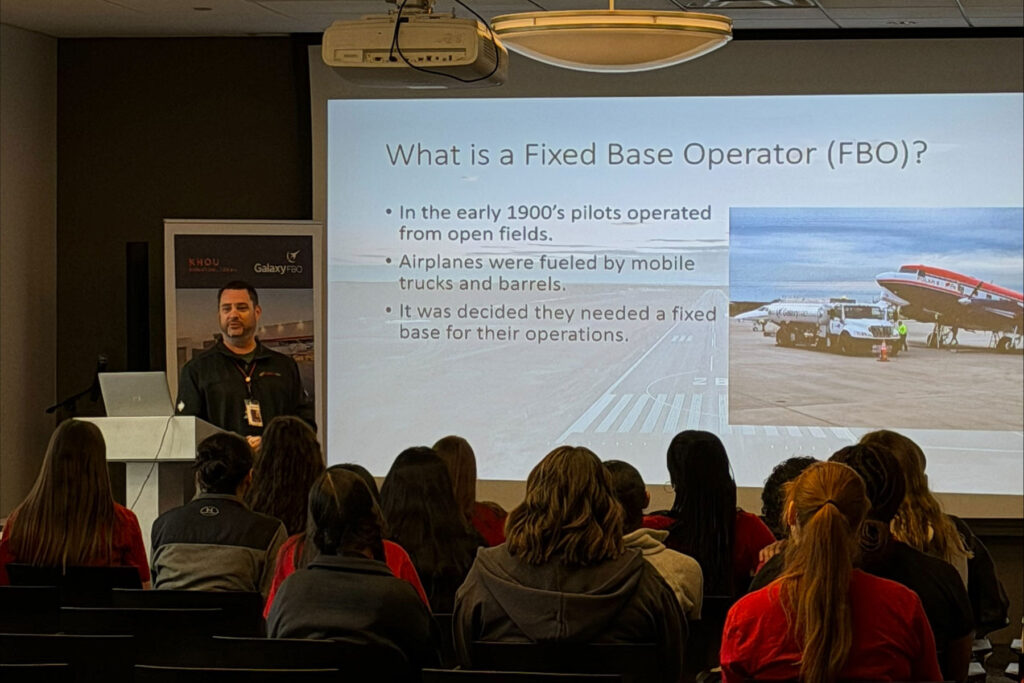
“We’re always thrilled to welcome students who are curious about aviation,” said John Bridi, Regional Manager at Galaxy FBO. “Programs like Leadership High School–North help us inspire the next generation of aviation professionals right here in Montgomery County.”
The Leadership High School–North program connects high-achieving high school juniors with local businesses, community leaders, and industries. Through hands-on learning experiences, students explore potential career paths and gain insight into leadership within their community.
Galaxy FBO’s participation underscores its commitment to community engagement and education, encouraging young people to pursue opportunities in STEM and aviation. With three Texas locations; Conroe (CXO), Houston (HOU), and Addison (ADS), Galaxy FBO continues to lead not only in customer service and safety but also in inspiring future leaders.

For more information on LHS-North, click here.
Whether you’re flying in for a match or hosting international guests, Galaxy FBO’s premier facilities in Houston (HOU), Conroe (CXO), and Addison (ADS) are ready to welcome you with seamless, world-class aviation services.
Houston Match Schedule – NRG Stadium
Houston will host seven matches at NRG Stadium, including both group stage and knockout rounds:
- June 14, 2026: Germany 🇩🇪 vs Curaçao 🇨🇼
- June 17, 2026: Portugal 🇵🇹 vs COD/Jamaica/New Caledonia
- June 20, 2026: Netherlands 🇳🇱 vs Ukraine/Sweden/Poland/Albania
- June 23, 2026: Portugal 🇵🇹 vs Uzbekistan 🇺🇿
- June 26, 2026: Cabo Verde 🇨🇻 vs Saudi Arabia 🇸🇦
- June 29, 2026: Round of 32 – 1C vs 2F
- July 4, 2026: Round of 16 – W73 vs W75
Fans flying in for Houston’s matches will find Galaxy FBO at William P. Hobby Airport (HOU) the most convenient gateway — located just minutes from NRG Stadium, with U.S. Customs, executive lounges, and concierge ground transportation available.
For those seeking a more relaxed arrival, Galaxy FBO at Conroe North Houston Regional Airport (CXO) offers spacious hangars, ramp space, and luxury amenities; ideal for avoiding heavy event traffic while staying within easy reach of downtown Houston.
Dallas Match Schedule – AT&T Stadium (Dallas Stadium)
In North Texas, AT&T Stadium (renamed Dallas Stadium for FIFA World Cup play) will host nine matches, including a semifinal on July 14:
- June 14, 2026: Netherlands 🇳🇱 vs Japan 🇯🇵 (Group F)
- June 17, 2026: England vs Croatia 🇭🇷 (Group L)
- June 22, 2026: Argentina 🇦🇷 vs Austria 🇦🇹 (Group J)
- June 25, 2026: Japan 🇯🇵 vs Albania/Poland/Sweden/Ukraine (Group F)
- June 27, 2026: Jordan 🇯🇴 vs Argentina 🇦🇷 (Group J)
- June 30, 2026: Match 78 – Round of 32
- July 3, 2026: Match 88 – Round of 32
- July 6, 2026: Match 93 – Round of 16
- July 14, 2026: Match 101 – Semi-Final
For travelers attending matches in Dallas or Arlington, Galaxy FBO at Addison Airport (ADS) offers the perfect combination of convenience, privacy, and efficiency; just minutes from major highways and within easy reach of the Dallas Stadium.
With the world watching, Texas is set to become a global hub for business and leisure aviation. Galaxy FBO is ready to ensure that your World Cup experience, from arrival to departure is smooth, comfortable, and memorable.
Why Choose Galaxy FBO
- Premium facilities at HOU, CXO, and ADS
- Fast and secure arrivals with U.S. Customs clearance
- Luxury passenger and crew amenities
- Ground transportation coordination (car rentals, chauffeurs, hotel arrangements)
- Large hangar space and ramp capacity for all aircraft types
- Award-winning team, with utmost safety standards (IS-BAH Stage 2 Certified)
- Whether you’re flying fans, athletes, or executives, Galaxy FBO delivers a championship-level experience at every touchpoint.
Plan Ahead for World Cup 2026
The 2026 FIFA World Cup will take place June 11 – July 19, 2026, with Houston and Dallas among the most in-demand host cities. Advance planning for aircraft parking, ground handling, and accommodations is strongly recommended.
This year’s event marked a meaningful milestone: the 10th anniversary of Angel Reach’s very first gala, which was also hosted at Galaxy FBO CXO back in 2015. The Wings, Wheels & Heels inaugural gala helped launch a decade of community support and awareness for an organization that continues to change lives throughout Montgomery County.
The Angel Reach 2025 Soaring to a Brighter Future event, catered by our sister company Black Walnut, brought together community leaders, aviation professionals, and local partners for an evening of food, connection, and generosity. Guests learned about Angel Reach’s life-changing programs, which provide housing, mentoring, and education opportunities to help young adults build independent, stable futures.
“Hosting this event gave us the opportunity to highlight the incredible work Angel Reach does right here in our community,” said John Bridi, Regional Manager, Galaxy FBO. “As a company rooted in Montgomery County, we believe in using our platform not only to serve travelers, but to support the people and organizations lifting others every day.”
The evening raised valuable awareness for Angel Reach’s mission and strengthened connections between the aviation and nonprofit communities. Through events like this, Galaxy FBO continues to demonstrate that its commitment to excellence goes far beyond the runway—it’s about building community, compassion, and opportunity.
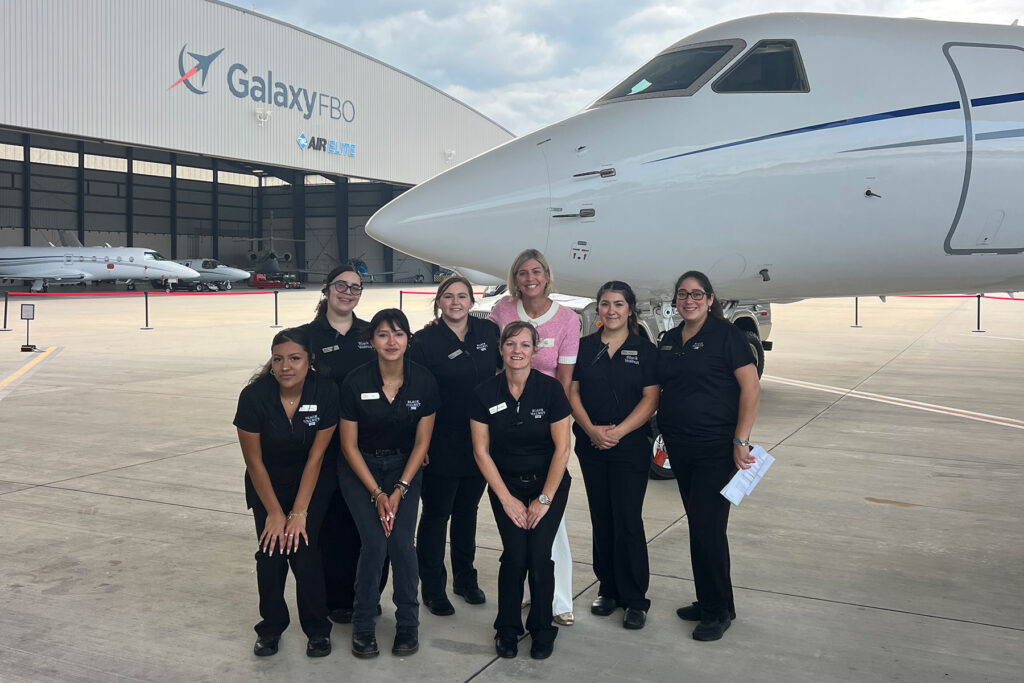

Through events like this, Galaxy FBO reaffirms its commitment to using its facilities as a platform for good — connecting the aviation community with organizations making a lasting impact beyond the runway.
Giving Tuesday: Lifting Others Higher
As Giving Tuesday arrives on December 2, 2025, Galaxy FBO invites everyone to join us in supporting local causes that help our neighbors soar to new heights. Whether through donations, volunteer work, or spreading awareness, your contribution can help Angel Reach continue its mission of hope and empowerment.
To learn more or make a donation, visit angelreach.org.
Together, we can help more young people find stability, strength, and a brighter future — one step, one flight, and one act of kindness at a time.
This recognition, awarded by the International Business Aviation Council (IBAC), validates Galaxy’s ongoing commitment to world-class safety, service excellence, and operational integrity. The certification is effective through August 2027, marking another milestone in Galaxy’s steady advancement through IS-BAH’s rigorous multi-stage safety program.
What the IS-BAH Certification Means
The IS-BAH program is the global benchmark for safety and quality in business aviation ground-handling operations. Built on the foundation of the ICAO Safety Management System (SMS) framework, it defines best-practice standards for everything from aircraft marshaling and fueling procedures to emergency preparedness, passenger handling, and ground-support equipment maintenance.
- Stage 1 confirms that an FBO has implemented the proper infrastructure to support safety management.
- Stage 2 which Galaxy has now achieved—demonstrates that safety risks are being effectively managed, not just identified.
- Stage 3 – the final level now pending, will soon verify that Galaxy FBO safety practices are fully integrated into daily operations and culture.
Out of nearly 3,000 FBO locations across the U.S., only a select few meet these stringent international standards. In Texas, just six FBO brands hold active IS-BAH certifications—and Galaxy FBO is proud to be the only FBO with certified facilities at both Conroe (CXO) and Addison (ADS). At Houston Hobby (HOU), Galaxy shares this distinction with only one other provider, underscoring its leadership in aviation safety statewide.
A Culture of Continuous Improvement
Achieving Stage 2 IS-BAH certification required detailed audits across multiple operational areas, including emergency response planning, training programs, airside operations, health and safety standards, and security compliance. The auditors specifically noted Galaxy’s mature safety culture, proactive risk management practices, and comprehensive personnel training as key strengths. Galaxy’s Director of Safety & Quality Management leads an internal auditing and improvement process that ensures every team member—from line technicians to customer-service representatives, understands and applies the same elevated standards. This consistency is what gives customers confidence, whether they’re flying in for a quick tech stop, parking a large-cabin business jet, or coordinating high-profile international arrivals.
This achievement positions Galaxy FBO among the state’s elite aviation service providers, reinforcing its reputation for reliability, safety, and premium service. As the company prepares to support global events such as the 2026 FIFA World Cup, its IS-BAH Stage 2 status ensures that safety remains at the heart of every mission. From ramp operations to customer hospitality, Galaxy FBO continues to deliver a safe, seamless, and exceptional experience for passengers and crew alike, raising the standard not just for Texas, but for the entire business aviation industry.
About IS-BAH and IBAC
The International Business Aviation Council (IBAC), headquartered in Montreal, oversees the IS-BAH program in cooperation with the National Air Transportation Association (NATA). The program is designed to promote safe, efficient, and sustainable operations across the global business-aviation community. Learn more at ibac.org/is-bah
The OBAP ACE Academy marked the culmination of an immersive experience for 40 students, ages 13 to 18, who spent the week exploring the vast world of aviation and aerospace.
Co-sponsored by the FAA and the National Black Coalition of Federal Aviation Employees, the ACE (Aerospace Career Education) Academy is designed to introduce middle and high school students to the fundamentals of flight, aviation history, air traffic control, maintenance, aircraft design, drones, and more. The program featured hands-on field trips to aviation facilities, including CBP Conroe, United Airlines maintenance hangars, air traffic control towers, Lone Star Flight Museum, Space Center Houston, and CommutAir, giving students an up-close view of aviation careers in action.
The final day—Graduation and Fly Day—was a celebration of knowledge, passion, and future potential. Students took part in their first flights with Certified Flight Instructors and were recognized for their engagement and growth throughout the program. Galaxy FBO was honored to provide a welcoming venue for this milestone moment, where students, families, mentors, and aviation professionals gathered to celebrate the next generation of aerospace talent.

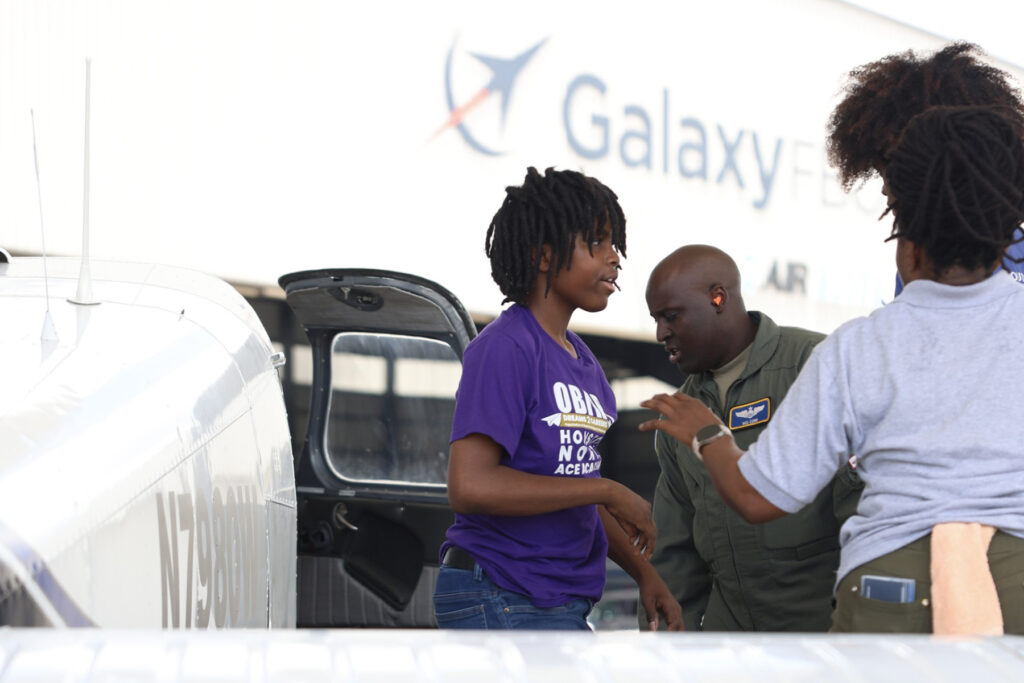

Investing in the Future of Flight
As part of Galaxy FBO’s ongoing commitment to aviation education, workforce development, and community engagement, we are proud to support programs like OBAP’s ACE Academy. Events like these not only offer exposure to the possibilities within the aviation industry but also help bridge the opportunity gap for underrepresented youth in aerospace.
To learn more about OBAP and the ACE Academy, visit obap.org.
Photo Credit: Kelsey Davis
This full-day seminar—hosted by Coats Aviation Law, PC, a recognized leader in business aviation law—is tailored for aircraft owners, flight departments, operators, and business aviation service providers. Attendees will receive actionable legal insights on the most pressing topics impacting aviation professionals today.
Seminar Highlights:
- Aircraft tax strategies and state/federal compliance
- FAA regulations, including Part 91 and Part 135 operations
- Aircraft transactions, leases, and ownership structures
- Insurance best practices and risk mitigation
- And more—delivered by experienced aviation law professionals
This industry-focused seminar is free for current STXBAA members and just $70 for non-members. Breakfast and lunch will be provided, making it an informative and engaging networking opportunity for Houston’s growing aviation community.
Galaxy FBO is more than just an award-winning fixed base operation—our facility in Conroe North Houston Regional Airport (CXO) serves as a hub for aviation professionals, hosting high-level industry events that advance safety, compliance, and innovation in business aviation.
Event Sponsors:
- Guardian Jet
- Galaxy FBO
- LL Johns Aviation Insurance
Seating is limited, early registration is encouraged
This year, Galaxy FBO at Addison Airport (ADS) earned a spot among the Top 10 U.S. FBOs, ranking #4 nationwide with an impressive overall score of 9.63. The score reflects high performance across six essential service categories: Line Team, Customer Service Representatives (CSRs), Facility, Amenities, Promptness & Efficiency, and Value for Price.
In addition to this individual location honor, Galaxy FBO was once again named the #1 Small FBO Chain (3–10 locations)—marking its third consecutive year earning this top distinction in 2023, 2024, and 2025. With an exceptional chain-wide score of 9.68, Galaxy FBO continues to set the standard for excellence across its three locations: Addison (ADS), Conroe (CXO), and Houston Hobby (HOU).
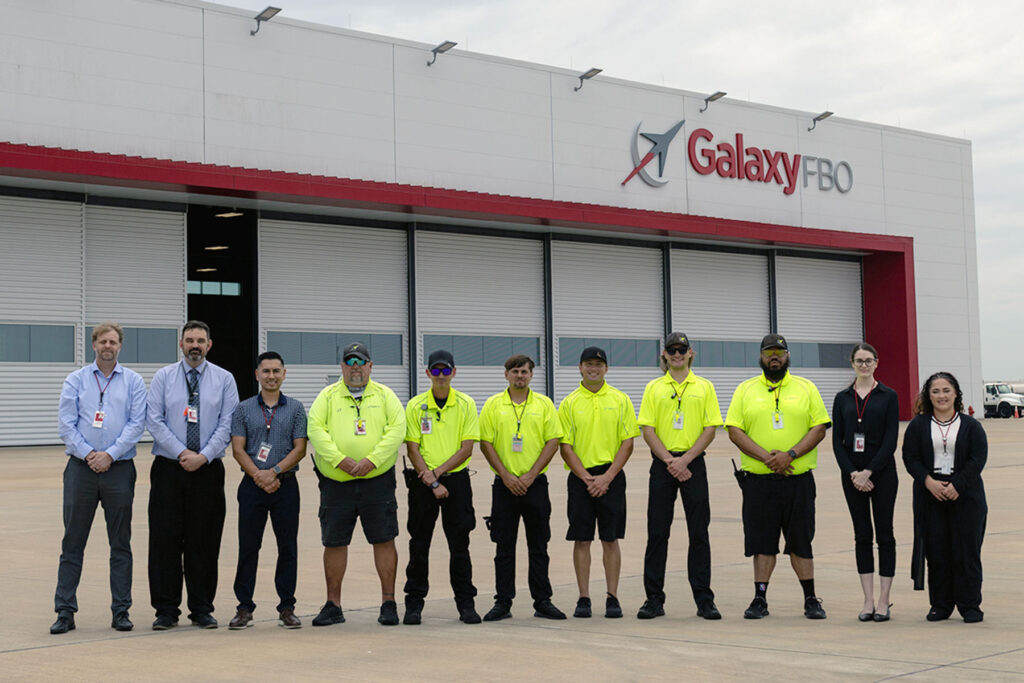
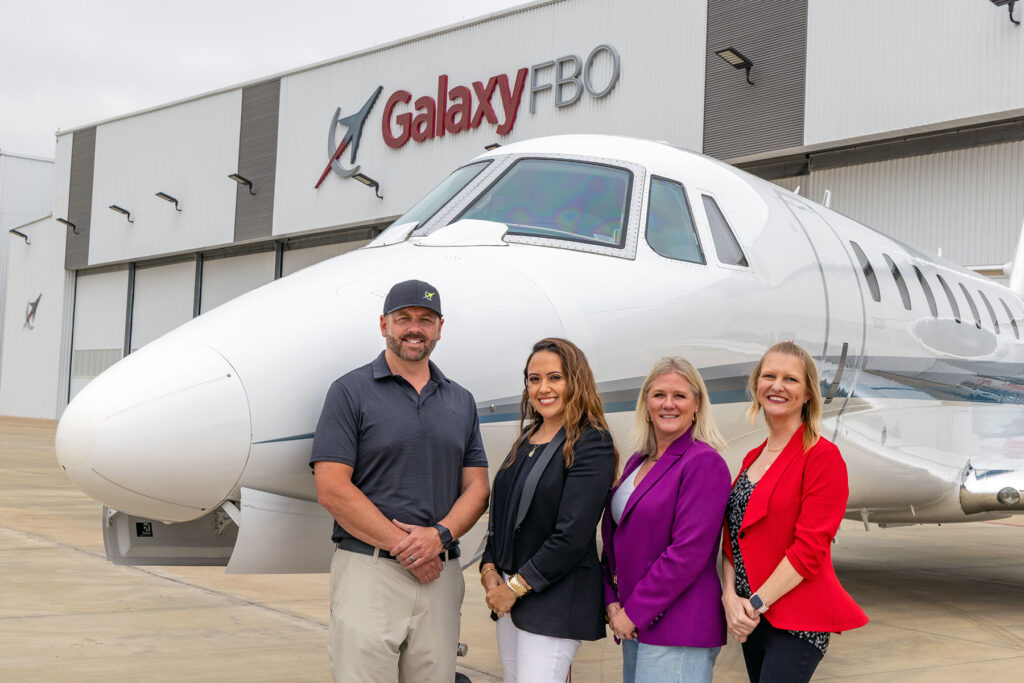
The Professional Pilot PRASE (Preferences Regarding Aviation Services and Equipment) Survey, now in its 52nd year, is one of the most trusted benchmarks in the business aviation industry. In 2025, more than 8,000 individual evaluations were submitted by qualified operators, scoring FBOs on the core elements that matter most to pilots, dispatchers, and flight departments.
Galaxy FBO’s continued presence at the top of the rankings is a testament to its relentless focus on customer service, operational excellence, and facility innovation. Whether you’re flying to Greater Houston or Dallas Metroplex – Galaxy FBO provides a seamless and elevated ground experience.
An FAA Part 139 airport is a certificated airport in the United States that meets the safety and operational standards outlined in Title 14 of the Code of Federal Regulations (CFR) Part 139. These regulations are issued by the Federal Aviation Administration (FAA) and are primarily focused on airports that serve commercial air carrier operations using aircraft with more than 30 passenger seats. Airports must be Part 139 certificated if they serve scheduled / unscheduled commercial operations using aircraft with more than 30 seats, and if they want to qualify for certain types of federal funding through the Airport Improvement Program (AIP).
Becoming an FAA Part 139 certificated airport would offer several strategic advantages to Conroe-North Houston Regional Airport (CXO)—especially given its growing role in general and business aviation.
Economic Growth
Part 139 certification signals that the airport meets rigorous federal safety and operational standards. This can boost CXO’s reputation with charter operators, corporate flight departments, insurance providers. It essentially adds another layer of trust and professionalism to CXO’s growing profile. Part 139 certification positions CXO to support larger, scheduled commercial operations.
A certificated airport is more appealing to aviation-related businesses and commercial developers, which could lead to increased property values and tax base expansion.
By supporting potential commercial or regional air service, CXO could boost tourism to Montgomery County, attract more conferences and corporate travelers and improve access for companies headquartered locally. This increases spending at hotels, restaurants, retail, and transportation providers throughout the region. As Montgomery County continues to grow, Part 139 certification would reinforce CXO’s role as a critical economic engine, not just for aviation, but for regional mobility and resilience. It would help diversify the local economy beyond oil & gas, real estate, and healthcare by anchoring it in aerospace and transportation infrastructure.
With Part 139 status, CXO becomes eligible for larger and more frequent FAA Airport Improvement Program (AIP) grants and potentially TxDOT aviation funding. These funds reduce the burden on local taxpayers while supporting capital improvements that enhance safety and capacity.
Improved Safety
FAA Part 139 certification significantly enhances the overall safety framework of an airport by establishing strict operational standards that must be continuously met and maintained. For Conroe-North Houston Regional Airport (CXO), certification would ensure dedicated Aircraft Rescue and Firefighting (ARFF) capabilities, enforce rigorous inspection and maintenance protocols for runways and taxiways, and require comprehensive emergency response planning and wildlife hazard management. These measures create a safer environment for aircraft operators, passengers, and airport personnel, while also aligning CXO with national best practices and increasing its ability to respond effectively to both routine and emergency situations.
FAA Part 139 Will Help CXO & Montgomery County.
While the Dallas–Fort Worth Metroplex is served by four FAA Part 139 airports, the Greater Houston area has only three—with none located in the fast-growing North Houston region. This highlights a significant opportunity for Conroe-North Houston Regional Airport (CXO) to fill a geographic and operational gap in the region’s aviation infrastructure.
In Summary, FAA Part 139 certification at CXO would unlock new levels of economic opportunity for Montgomery County—supporting jobs, investment, connectivity, and long-term growth. It’s more than a regulatory step—it’s a strategic move for the county’s future.
At Galaxy FBO, our commitment to providing premier service on the ground is matched only by our passion for aviation. That commitment was recently recognized when Chayston Crawford, a Line Service Technician at our Conroe North Houston Regional Airport (CXO) location, received a NetJets Challenge Coin—a symbol of excellence awarded only to those who deliver an exceptional experience.
What Is the NetJets Challenge Coin?
In the world of business aviation, few accolades carry as much day-to-day meaning as the NetJets Challenge Coin. Presented directly by NetJets flight crews, these coins are awarded as a personal gesture of appreciation for outstanding performance, professionalism, and attention to detail. Whether it’s flawless handling of an aircraft arrival, a thoughtful assist with ground transportation, or proactive safety procedures—receiving a NetJets coin signals you’ve made a lasting impression. NetJets, the world’s largest private jet fractional operator, holds its partners to the highest operational standards. Only a select few FBO team members across the country have earned this honor. At Galaxy FBO, we’re proud to share that over a dozen of our team members have been recognized by NetJets with this coin—a testament to our culture of excellence and service.

While working full-time as a technician on our Line Service team, Chayston is also pursuing a degree in aviation management. His passion for aviation shines through in his work—whether it’s fueling aircraft, coordinating ramp movements, or going above and beyond to make NetJets crews and passengers feel welcome and safe. Receiving a NetJets Challenge Coin from a Citation Longitude Crew is a major milestone in his young career, and one that we’re incredibly proud to celebrate.
We visited your FBO late on the evening of Wednesday April 2, 2025. We flew in on N825QS. We’re a Netjets Longitude. Upon arrival we were met by one of your line techs, Chayston Crawford, who was staying late awaiting our arrival. As it was near 11pm, we were unsure if we could get a ride share to our hotel. Without hesitation, Chayston told us if we had any problems, he would drive us to where we needed to go. In addition, Chayston could not have been more helpful in helping us secure the plane and attending to everything we needed. On arrival the following morning, we were again met by Chayston who remembered us and could not have been more helpful in helping us move and prepare the plane for our trip. At every move, Chayston was happy to help and he’s a great reflection on your FBO! I’ve been at Netjets for 19 years and I can say without hesitation that the service we received from Chayston and everyone there was the best I’ve experienced. Your FBO is one of the nicest and cleanest ones I’ve been in as well! We were both very impressed. Each pilot @ Netjets is given challenge coins to recognize outstanding service when we see it. I was happy to award Chayston with a coin yesterday morning and I let my Chief Pilot know as well.
NetJets Captain David Gross.
A Preferred FBO for NetJets in North Houston
Galaxy FBO is a preferred partner for NetJets operations in North Houston. We undergo regular audits and consistently exceed NetJets’ stringent safety and service criteria. From rapid turnarounds to impeccable ramp coordination, our team is trusted to handle the needs of one of the most prestigious flight departments in the world. Located just north of Houston, Galaxy FBO at Conroe North Houston Regional Airport offers a combination of award-winning service, first-class amenities, and unmatched ramp-side hospitality. We’re proud to serve NetJets and every operator that touches down on our ramp with the same precision, care, and “attitude of absolutely.”
At Galaxy FBO, we know that meaningful recognition isn’t earned overnight—it’s built through consistent, quality service and a genuine passion for aviation. Chayston’s coin is a proud moment not just for him, but for our entire team. It reminds us why we do what we do, and how the small moments—like a well-executed arrival or a warm welcome on a rainy day—can make a big difference.
Congratulations, Chayston—and thank you, NetJets, for continuing to recognize excellence.